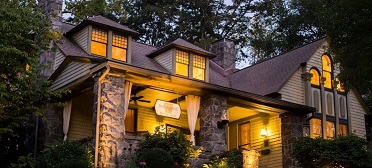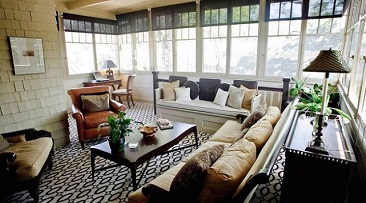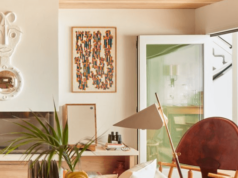 ATLANTA—Throughout the current pandemic, Atlanta’s historic Stonehurst Place has continued to provide a safe place to stay for travelers in search of boutique luxury—all with a dose of eco-friendliness thrown in. The eight-suite property, owned by Barb Shadomy and first constructed in 1896, has features including a solar thermal system for water heating, a greywater recycling system, and rainwater purification system.
ATLANTA—Throughout the current pandemic, Atlanta’s historic Stonehurst Place has continued to provide a safe place to stay for travelers in search of boutique luxury—all with a dose of eco-friendliness thrown in. The eight-suite property, owned by Barb Shadomy and first constructed in 1896, has features including a solar thermal system for water heating, a greywater recycling system, and rainwater purification system.
“My partner and I purchased Stonehurst in 2007 and after 14 months of intense renovation, I returned the grand old lady back to her youthful self—with a few modern and green improvements,” Shadomy says. “We have not closed during the current pandemic and have been welcoming guests with a modified and respectful socially distant southern hospitality.” The property is managed by Grace and John Cardona.
Stonehurst Place is listed on the National Historic Register and is in the Midtown area of Atlanta. They are not easy to see on the structure, but 10 solar thermal collectors sit on the south facing roof above the Sleeping Porch. The sun’s energy is transported through food-grade glycol to the basement, where a heat exchanger transfers the sun’s heat to water. This solar heated water is stored in three super-insulated storage tanks that supply two large gas water heaters.
“The beauty is the water heaters are heating already hot water, so we have greatly reduced the energy expended to heat water for 12 shower heads, three large spa tubs, 11 sinks, two commercial laundry machines and one commercial dishwasher,” Shadomy says.
Brac Greywater Recycling System
Separate plumbing lines channel water from sinks, bathtubs and showers into the Brac Greywater Recycling System. The system takes in greywater, filters and treats it, then sends it to the gardens for subterranean irrigation.
 “We first used the greywater for toilet flushing but later reconfigured the system to use for irrigation when we realized that we were not able to use all of the treated water each day to flush toilets,” Shadomy says. “As our gardens are extensive, we’re able to use every bit of collected water—during non-dormant months—for irrigation.”
“We first used the greywater for toilet flushing but later reconfigured the system to use for irrigation when we realized that we were not able to use all of the treated water each day to flush toilets,” Shadomy says. “As our gardens are extensive, we’re able to use every bit of collected water—during non-dormant months—for irrigation.”
Rainwater is collected from the roof in protected gutters then channeled through underground pipes around the house to underground (3,500 gallons) water storage tanks. Some of that rainwater is sent to irrigate Stonehurst Place’s gardens, a National Wildlife Federation Certified Wildlife Habitat. The remainder of the water goes through a six-step purification process: sediment filter, carbon filter, soda ash, chlorinate, and dechlorinate. UV light kills any bacteria.
The purified rainwater is used throughout the house as crystal clear and clean drinking water. Guestrooms have French swing-top bottles of the purified water, and reusable glasses. These are refreshed daily. The purified rainwater is also used in laundry, sinks, and dishwashers, and reduces the property’s dependency on municipal water. The purified water also supplies the solar-heated water tanks.
Additional Green Steps Taken
Stonehurst Place has one Tesla and one universal electric vehicle charging station. Except for a few antique lamps, Stonehurst Place uses LED lighting exclusively. Lamps throughout the inn are on timers. In guestrooms Gilchrist & Soames naturally-derived Bee Kind paper bottle amenities are used because they contain no parabens, phthalates, or artificial colors and the innovative 100 percent recyclable paper bottle packaging represents a 59 percent reduction in material by weight and a 92 percent reduction in waste space compared to rigid plastic bottles.
 “In prior years we kept bees on-site to use the honey for guest service, and this amenity line was a nice tie-in,” Shadomy says. “We are proud to offer this line because a portion of Gilchrist & Soames profits from BeeKind sales is given to the Honey Bee Research Facility at the University of California, Davis. As a next step, used guest soaps that are left behind are sent to Clean The World for recycling and donation to those who need soap but either don’t have access to it or haven’t the funds to purchase it.”
“In prior years we kept bees on-site to use the honey for guest service, and this amenity line was a nice tie-in,” Shadomy says. “We are proud to offer this line because a portion of Gilchrist & Soames profits from BeeKind sales is given to the Honey Bee Research Facility at the University of California, Davis. As a next step, used guest soaps that are left behind are sent to Clean The World for recycling and donation to those who need soap but either don’t have access to it or haven’t the funds to purchase it.”
Some additional green features include separately zoned heating and air-conditioning, low-flow toilets and faucets, eco-friendly cleaning and laundry products, and in-room recycling. An on-site compost bin produces soil for the garden. Guestroom linens are changed every third day unless otherwise requested by the guest. Guestroom towels are refreshed when they are left on the floor but if hung up to dry, they are left there to be used again. Comphy micro-fiber sheets are eco-friendly because they take much less time to dry than cotton.
“All purchases are made with sustainability in mind, for example buying office paper that is made from recycled paper stock,” Shadomy says.
COVID-19 Action Steps
To ensure a safe and hygienic stay during the current pandemic, commonly touched items, such as doorknobs, light switches, telephones, faucets, vanities, etc. are disinfected. “We’re well-stocked with sanitizers, cleaners, disinfectants, and continue to stay updated and follow CDC prevention measures and recommended cleaning procedures,” Shadomy says. “To comply with social distancing recommendations, for breakfast service, we are now serving at the ends of our communal dining table, and on the screened porch—at staggered times rather than ad hoc as the guest chooses.”
Glenn Hasek can be reached at greenlodgingnews@gmail.com.






